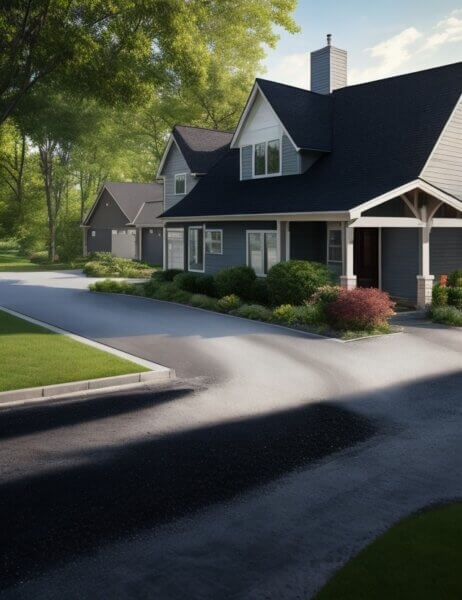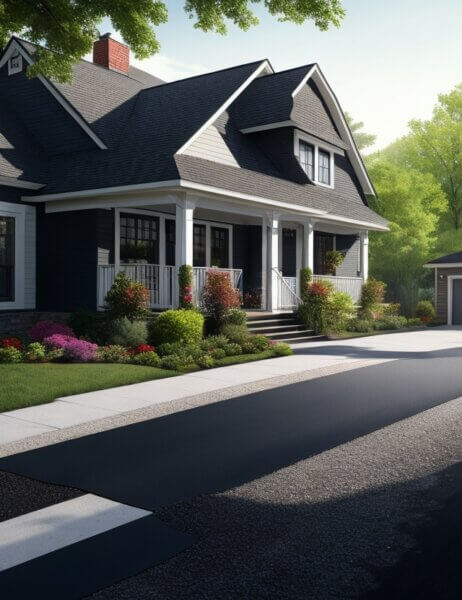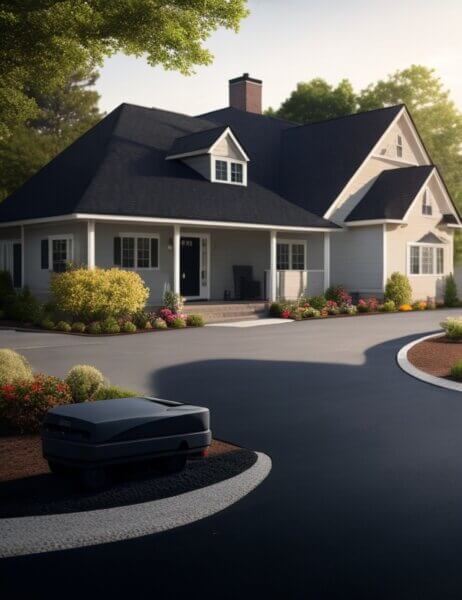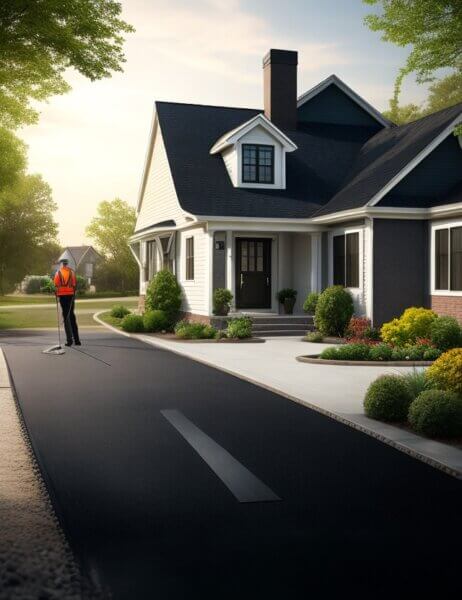Asphalt Driveway Cost: How Much Does It Cost To Pave A Driveway?
Regarding driveway paving, there are various options available to homeowners. Asphalt is one of the most popular choices to pave a driveway due to its cost-effectiveness and longevity.
However, understanding the cost of asphalt driveways is essential to maximize value and minimize costs. In this article, we will examine the factors that affect driveway paving costs and compare the prices of resurfacing vs. installing a new driveway. We will also discuss different material options and provide tips on maximizing value and minimizing costs.
This discussion will give readers a comprehensive understanding of asphalt driveway costs and how to make the most cost-efficient decisions.
The importance of understanding driveway paving costs
The cost of driveway paving can vary greatly depending on several factors. These include the driveway’s size, the materials used, and the project’s location. Any existing landscaping or obstacles, such as trees or fences, can also influence the cost.
Understanding these factors is essential to creating a realistic budget and expectations for driveway paving.
Factors that influence driveway cost
Factors such as size, complexity, and materials used can affect the price of a driveway paving project. For example, the cost to pave a driveway will vary depending on the driveway’s size, the design’s complexity, and the type of materials used.
Other factors that can influence the cost of a paving project include labor costs, access to the site, and the project’s location. For instance, larger driveways require more materials and labor costs, while access to the site and the area can affect the cost of transportation of materials needed for the job.
Finally, the overall complexity of the design can also have an impact on the cost of the driveway paving project. In summary, paving a driveway cost is determined by factors such as:
- Size
- Complexity
- Materials used
- Labor costs
- Access to the site
- The location of the project.
Asphalt Driveway vs. Concrete Driveway: Which is more cost-effective?
When it comes to driveway paving, the decision between asphalt and concrete can be difficult. It is essential to consider factors such as initial cost per square foot, long-term maintenance and durability considerations, and the average cost to pave an asphalt or concrete driveway.
Asphalt driveways have a lower initial cost per square foot, while concrete driveways require less maintenance over time, but the installation cost is typically higher. Moreover, the average price to pave an asphalt or concrete driveway can vary significantly depending on the size and location of the driveway.
Comparing the initial cost per square foot
Comparing initial cost per square foot is important when deciding on paving a surface. Asphalt driveways are typically more expensive than concrete driveways, with asphalt costing around $3-$4 per square foot, while concrete can cost around $2-$3 per square foot. However, asphalt driveways are more cost-effective in the long term due to their durability.
Asphalt driveways can last up to 25 years with proper maintenance, while concrete driveways only last up to 15 years. Additionally, asphalt driveways are easier to repair, with repairs costing much less than that concrete. Furthermore, asphalt driveways offer better traction and can handle colder climates better than concrete.
With all these factors in mind, here are the main points to consider when comparing the initial cost per square foot:
- Asphalt driveways cost around $3-$4 per square foot, while concrete costs around $2-$3 per square foot
- Asphalt driveways can last up to 25 years with proper maintenance, while concrete driveways only last up to 15 years
- Asphalt driveways are easier to repair, with repairs costing much less than that concrete
- Asphalt driveways offer better traction and can handle colder climates better than concrete
- The long-term cost-effectiveness of asphalt driveways makes them the better choice for many homeowners
Long-term maintenance and durability considerations
Maintaining a long-term, durable surface requires careful consideration of repair costs, longevity, and weather resistance. Asphalt driveways are cost-effective and have relatively low maintenance costs. When compared with other paving materials, asphalt driveways are relatively inexpensive upfront. However, the long-term cost may be more expensive due to the need for regular maintenance or repairs. Additionally, the quality of the asphalt used in the driveway will affect its lifespan, with higher-quality asphalt lasting longer and withstanding more abuse from the elements. Regarding weather resistance, asphalt generally fares well in mild climates but may suffer in extremely hot or cold areas.
| Factors | Asphalt | Other Paving Materials |
|---|---|---|
| Initial Cost | Low | High |
| Maintenance Cost | Low | High |
| Longevity | Moderate | High |
| Weather Resistance | Moderate | High |
Cost guide: Average cost to pave an asphalt or concrete driveway
The installation of an asphalt or concrete driveway can vary significantly in cost depending on the size and scope of the project. Generally, the cost to pave an asphalt driveway ranges from $2.50 to $4.00 per square foot, while the price to pave a concrete driveway is typically between $4.00 and $6.00 per square foot.
The cost of a driveway project will depend on factors such as:
- Size of the area to be paved
- Cost of materials
- Labor costs
- Accessibility of the area
These factors can have a significant impact on the overall cost of the project. The type of paving material used and the amount of preparation required for the installation will also influence the total cost.
For example, an asphalt driveway may require excavation for proper installation, which can add to the expense. In contrast, a concrete driveway may need reinforcing before being installed, which can also increase the project’s cost.
Factors Affecting Driveway Paving Cost
The driveway installation is an essential component of a home’s landscape, and the cost of paving a driveway depends on several factors. These include the size and shape of the driveway, the material used, and additional charges such as excavation, drainage, and landscaping.
Additionally, the labor cost of paving a driveway will vary depending on whether the homeowner decides to hire professionals or attempt the task themselves. Understanding the implications of these factors is critical to making a cost-effective decision when it comes to driveway paving.
Driveway size and shape: How to square footage impacts the cost
Square footage is crucial in determining the cost of paving a driveway. The larger the driveway, the more material and labor costs associated with the project. Additionally, the shape of the driveway can affect the price. For example, a curved driveway will require more material and labor than a straight driveway.
Asphalt driveways come in many sizes and shapes, and the project’s cost can vary greatly depending on the size and shape of the driveway. As a result, it is essential to consider the size and shape of the driveway when calculating the cost of paving a driveway.
Type of driveway material and its price range
The type of driveway material used is a significant factor in the cost of an asphalt driveway. The most common materials for driveways are asphalt, concrete, gravel, and brick pavers.
- Asphalt is the least expensive option, usually costing between $2 and $5 per square foot.
- Concrete is a more expensive option and generally costs between $4 and $8 per square foot.
- Gravel is the least expensive option but requires more maintenance than asphalt and concrete.
- Brick pavers are the most expensive option, usually costing between $10 and $20 per square foot.
Additional costs: Excavation, drainage, and landscaping
Additional costs associated with installing an asphalt driveway may include excavation, drainage, and landscaping services. Excavation involves digging and grading the area where the driveway will be installed, ensuring the land is level and clear of obstructions. Drainage is essential in installing an asphalt driveway, as it ensures that water is diverted away from the driveway and does not pool on it, causing damage.
Lastly, landscaping is often necessary to make the driveway more aesthetically pleasing. Landscaping could include:
- Laying down grass or flowers.
- Adding gravel or other decorative elements.
- Other small touches.
These additional costs may vary depending on the job’s complexity, the driveway’s size, and the level of detail desired.
Labor cost to pave a driveway: Hiring professionals vs. DIY
Installing an asphalt driveway can be a big undertaking, requiring careful consideration of labor costs for both professional and DIY approaches. Hiring a professional asphalt installation crew can be costly. Still, it may provide peace of mind that the job will be completed correctly and efficiently and that any issues will be addressed correctly. On the other hand, DIY driveway paving can be a cost-effective solution; however, it is essential to consider the time and skill required to complete the job satisfactorily.
Furthermore, it is essential to factor in the cost of materials, equipment rental, and hiring professional assistance for help if the job still needs to be completed satisfactorily. Ultimately, the best solution for installing an asphalt driveway will depend on the individual’s budget and experience level.
Resurfacing vs. Installing a New Driveway: Cost Comparison
When considering the cost of driveway paving, it is essential to consider whether resurfacing an existing driveway or installing an entirely new driveway is the best option. Resurfacing an existing driveway can provide several benefits, such as adding a new surface, repairing cracks, and improving the overall appearance while offering cost savings compared to a new installation.
On the other hand, building a new driveway requires additional considerations such as the type of material, level of compaction, drainage, and the size of the driveway, all of which will affect the installation cost. As a general estimate, the cost of a two-car driveway can range from $4,000 to $8,000, depending on the materials used.
Resurfacing an existing driveway: Benefits and cost savings
Resurfacing an existing driveway can offer several advantages, including the potential for significant cost savings. The homeowner can save hundreds, or even thousands, of dollars by resurfacing rather than replacing the entire driveway.
In addition, resurfacing is usually quicker and less disruptive to the homeowner, as the existing driveway can be partially taken up and replaced. Furthermore, resurfacing can extend the driveway’s life by many years, as the new asphalt will help protect the existing driveway from wear and tear.
For these reasons, resurfacing is often the more attractive option for homeowners deciding between resurfacing and installing a new driveway.
Building a driveway: Installation costs and considerations
Constructing a new driveway requires careful consideration of installation costs and potential impacts. The price of a new driveway can vary significantly depending on several factors, such as the driveway size, the type of asphalt used, and the complexity of the installation. Generally, the materials for a new driveway will range from $2 to $4 per square foot.
Labor costs can also vary, depending on the complexity of the job and the local labor rate. It is essential to factor in the price of excavation, grading, and other labor-related costs, as these can add significantly to the project’s total cost.
In addition to costs, it is crucial to consider the potential impacts of installing a new driveway, such as any necessary permits, possible disruption to landscaping or existing structures, and any local codes or regulations that may need to be considered.
Two-car driveway cost: Typical pricing and options
Having discussed the installation costs and considerations for building a new driveway, it is worth exploring the typical pricing and options for a two-car driveway. This type of driveway requires more space than a one-car driveway and requires more material and labor. As a result, the cost of a two-car driveway is usually higher than a one-car driveway.
A two-car driveway typically costs between $3,000 and $8,000, depending on the size, materials used, and any additional features or services included in the project. Asphalt for a two-car driveway can range from $2 to $6 per square foot, while a concrete driveway can cost between $4 and $15 per square foot.
If extra features or services are desired, such as a drainage system or a decorative finish, these will affect the project’s overall cost. A professional contractor can provide an estimate and help determine the best materials and options for the two-car driveway.
Type Of Driveway Material Options and How Much Does It Cost
Driveway material is an important consideration when planning a new driveway, as each type of material has its own cost, lifespan, maintenance requirements, durability, and customization. Asphalt driveways are one of the most commonly used materials and tend to be more cost-effective than other materials, although they require more maintenance over the years. Concrete driveways are more expensive than asphalt but are also more durable and can be customized with different textures and colors.
Gravel driveways are more affordable but require more maintenance and are less durable than asphalt or concrete. Additionally, the average cost per square foot of a gravel driveway can vary significantly depending on the size and type of gravel used.
Asphalt driveways: Cost, lifespan, and maintenance requirements
Installing an asphalt driveway requires an initial investment but offers a substantial return in terms of longevity and maintenance requirements. Asphalt driveways are cost-effective and require minimal maintenance when compared to other materials, such as concrete or gravel. Typically, an asphalt driveway costs between three to five dollars per square foot and can last up to fifteen years with proper maintenance, such as sealing every three to five years.
Additionally, asphalt driveways are easier to maintain, as they require only regular sweeping and occasional repairs for cracks and divots. These features make asphalt driveways an attractive option for many homeowners, as they can provide long-term value and convenience.
Concrete driveways: Price range, durability, and customization
Concrete driveways offer homeowners a range of customization options and durability, often at a higher price point than asphalt driveways. Concrete driveways are typically more expensive than asphalt driveways due to the labor and materials involved in the installation. The upfront cost of a concrete driveway may be higher, but concrete driveways last longer and require less maintenance in the long run.
Furthermore, concrete driveways can be customized to the homeowner’s preference, allowing for various colors, patterns, and textures. With proper maintenance, a concrete driveway can last for decades, making it a cost-efficient investment for homeowners.
Gravel driveways: Pros, cons, and the average cost per square foot
Gravel driveways offer a low-cost alternative to other driveway materials but require more frequent maintenance than other materials and may only last for a short time. They are easy to install and can be installed in various patterns and designs.
However, the gravel cost per square foot is higher than other materials, and the gravel must be replenished periodically. Gravel driveways are also more prone to washouts and challenging to repair.
The pros and cons of a gravel driveway can be summarized as follows:
- Low cost, easy to install
- High price per square foot, requires frequent maintenance
- Prone to washouts, challenging to repair
Maximizing Value and Minimizing Cost To Pave A Driveway
Proper driveway maintenance is essential to maximize value and minimize costs over the long term.
Selecting the suitable material and design for one’s specific needs can reduce the driveway’s overall cost and extend its lifespan. Careful consideration should be given to the long-term benefits and return on investment when selecting a driveway material and design to ensure the right choice for the desired outcome.
Proper maintenance tips to extend the lifespan of your driveway
Regular maintenance of your paved surface can help to preserve its condition and extend its lifespan. To keep your driveway in pristine condition, here are four essential tips:
- Inspect your driveway for any cracks, chips, and other signs of damage regularly.
- Sealcoat your driveway every three to five years to maintain the surface.
- Do not use deicers or other corrosive chemicals on the driveway, as this can cause damage to the asphalt.
- Remove snow and ice promptly to prevent damage from freezing.
Taking the time to perform regular maintenance tasks will help extend your asphalt driveway’s lifespan and ensure that your driveway remains a visual representation of your commitment to your property and your community.
Choosing the suitable cost by material and design for your specific needs
When selecting a material for a paved surface, it is essential to consider the specific needs of the user, as well as the design that will best complement the surrounding landscape. There are various options for driveway materials, such as asphalt, concrete, brick, pavers, and gravel. Each of these materials has its unique characteristics and benefits. Asphalt, for example, is a popular choice for driveways due to its affordability and durability. Concrete is another popular option, but it is more expensive and requires more maintenance.
Brick is a decorative option that can create an attractive and custom design but is more expensive than asphalt and concrete. Paver stones are an excellent option for a custom design but require more maintenance than asphalt or concrete. Gravel is economical, but it is less durable than other materials and can be more challenging to maintain. Selecting the material and design that best meets the user’s specific needs and the surrounding landscape is crucial.
| Material | Pros | Cons |
|---|---|---|
| Asphalt | Affordable, Durable | Little flexibility for design |
| Concrete | Durable, Low maintenance | Expensive |
| Brick | Attractive, Customizable | Expensive, High maintenance |
| Pavers | Customizable, Low maintenance | Expensive |
| Gravel | Economical | Not as durable, Difficult to maintain |
Considering the long-term benefits and return on investment
Investing in a quality paved surface has the potential to bring long-term benefits and returns on investment. Choosing asphalt or concrete as the paving material is essential when determining the project’s total cost.
Asphalt is the preferred choice for many homeowners due to its superior performance, durability, and low maintenance requirements. Regarding long-term benefits, asphalt is generally more cost-effective than concrete due to its durability and maintenance-free characteristics. Additionally, asphalt offers faster installation and a smoother, more attractive finish than concrete, resulting in a higher return on investment.
When considering the long-term benefits and return on investment, asphalt is often the recommended option for driveway paving.
Conclusion
Driveway paving is a great way to enhance the look and value of your home. It requires careful consideration of the materials available, as well as the cost of installation.
Asphalt driveways are typically more cost-effective than concrete driveways. However, many factors must be considered when determining which material is best suited for your property. These factors include the size of the driveway, local labor costs, and soil type.
Additionally, resurfacing an existing driveway is generally more cost-effective than installing a new one. Ultimately, the driveway material you choose is up to you, but it is essential to compare the costs of various materials in order to maximize value and minimize costs.




